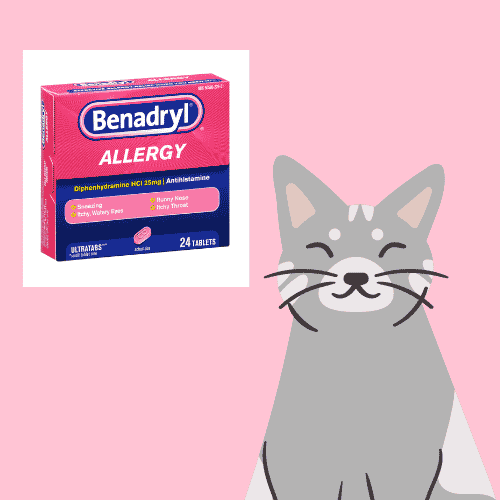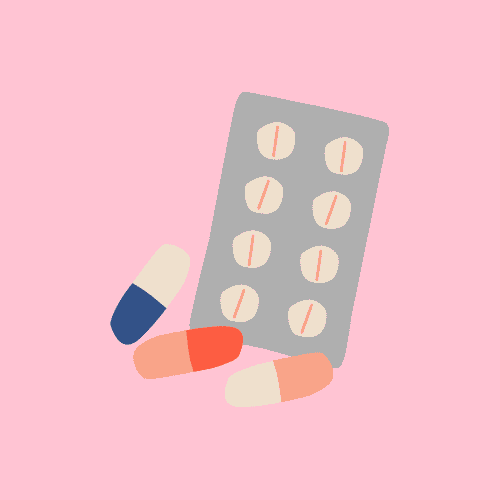When you experience allergy symptoms, you usually take Benadryl to alleviate the itching. Benadryl is frequently used to prevent allergic reactions, but what about cats? Can you give Benadryl to your cats? If yes, then how much Benadryl is lethal for cats?
Benadryl is easily accessible and safe for people, but cats don’t always react the same way toward this drug. Some cats may respond safe to any amount of Benadryl, while others may have serious side effects from too much. In cats, a lethal dosage of oral Benadryl is 20–40 pills. With pre-existing conditions, a lesser dose of Benadryl might have been enough to kill the cat.

Continue reading to learn more about Benadryl for cats, including how to use it, dosage, benefits, potential side effects, and natural alternatives.
What Is Benadryl Consist Of?
Benadryl is a name for the generic medication known as diphenhydramine hydrochloride. Benadryl is an antihistamine medicine that may be purchased without a prescription and is therefore available over-the-counter. You may get this antihistamine in the form of pills, capsules, liquid gels, or even liquid, and it comes in various doses or milligrams to choose from, depending on your requirements.

Benadryl is frequently used with many different drugs, some known to be harmful to cats. As a result, while purchasing the medicine, make sure to read the packaging carefully to confirm that diphenhydramine, the active component in Benadryl, is the only drug in the product you’re buying for your cat. Your vet will have generic diphenhydramine and a faster-acting injectable type.
Cats: The Best Spiritual Protectors
When Do Cats Need Benadryl?
Most feline furballs need medicine for itching or sores caused by allergies, pests, etc. Many different types of allergies may affect cats, and they can be found all over the world. They might find that using Benadryl helps them better manage their allergic reactions.
Some persons use it when traveling or suffering from motion sickness. In situations such as these, it has the effect of a relatively mild sedative. Benadryl can also be used to quiet a pet while moving into a new house or when expecting noisy visitors.
Benadryl can alleviate various comparable symptoms, including excessive scratching, agitation, anxiety, and restlessness. However, before administering the medication to your pet, you should first seek the advice of a qualified veterinarian.
The Lethal Dose of Benadryl for Cats
The lethal dosage of Benadryl in cats is not known. On the other hand, the oral dose reported to be the least lethal for a 10-pound cat was around 7 pills.
As a result of this, it is appropriate to propose that you do not give your cat more than two or three pills at a time all at once. Never feed your cat Benadryl without first consulting your doctor to avoid overdose and medical treatment.
Is Benadryl Safe for Cats?
The medication is thought to be perfectly safe for cats if the recommended dose of Benadryl is used. An overdose of Benadryl for cats can have significant adverse effects; in extreme cases, it can even be fatal.

If your cat is already receiving any of the following drugs, you should not give them Benadryl without first discussing the matter with your veterinarian:
- Amitraz
- Central Nervous System Depressants (CNS Depressants)
- Cisapride
- Metoclopramide
- Selegiline
- Barbiturates
Benefits and Uses of Benadryl for Cats
Here are a few verified and approved Benadryl uses that may be used for cats.
- Benadryl for General Cat Allergy Issues: Cats are susceptible to many allergic conditions, the most frequent of which are environmental and food allergies. Cat allergies frequently require multimodal treatment. Benadryl, on the other hand, is an effective treatment for itching, inflammation, and other allergic symptoms.
- Benadryl for the Treatment of Acute Allergy Reactions in Cats: Common acute allergic responses include stings from insects and vaccination reactions. If treatment is not received, each of these conditions might be deadly. Benadryl for felines is a fantastic first aid, but you still need to consult a doctor.
- Benadryl for Cats Suffering from Motion Sickness: Due to its anti-nausea action, Benadryl is given to cats during long automobile rides. When traveling with pets, diphenhydramine is an ideal choice because it works quickly and maintains its effects for a long time.
Side Effects of Benadryl in Cats
When given Benadryl, some cats can develop adverse reactions to the medication. You may notice any of the following negative effects in your cat as a result of using Benadryl:
- Sedation/sleepiness
- Agitation/excitement
- Dry mouth
- Difficulty urinating
- Drooling
- Diarrhea
- Vomiting
Within the first hour after administering Benadryl, most cats will begin to exhibit indications of unpleasant side effects.
Stop feeding your cat Benadryl immediately if you observe any of the signs while it is receiving the drug, and consult your cat’s veterinarian to find out what further steps you should take.
How to Give Cats Benadryl
It is important to use precaution while administering Benadryl to cats. Veterinarians recommend that this medication be given in liquid form using a syringe. On the other hand, there is always a chance that your cat won’t enjoy the way it smells or tastes. If so, a compounding pharmacy can add fish or chicken flavoring to the liquid. Pills can be flavored if needed.
Benadryl can be included in senior cat food to make it easier to absorb. You should also avoid giving your cat some gel capsules since they may contain solvents that are poisonous to cats or that cause irritation to cats.
Why Do Cats/Felines Rub Their Teeth on You
Natural Alternatives to Benadryl for Cats
Most pet parents search for natural remedies for their feline family members’ allergic reactions. The following is a list of the most effective naturally occurring alternatives to Benadryl for cats:
Fish Oil
Fish oil is a brilliant source of omega-3 fatty acids, which helps prevent infections and strengthens the skin’s immune system. In addition to this, it is thought to be anti-inflammatory, which can help alleviate itching and hot patches.
Coconut Oil
Because it includes lauric acid, coconut oil can prevent your cat from producing yeast by acting as a natural antifungal. It protects cells by healing itchy, dry skin. It’s easy to apply and safe if the cat tastes it.
Chamomile
Apigenin, found in chamomile, is an anti-inflammatory compound. In addition, chamomile has antimicrobial properties that help destroy yeast and germs.
Do Cats Get Allergies?
Yes, cats may get allergies, and allergies in cats are relatively common. Cats get allergies when their immune systems respond to allergens. When an allergy develops, it is a response from the immune system that is trying to get rid of the allergen that caused it.
What Happens When a Cat Overdoses on Benadryl?
An overdose can result in a variety of unpleasant consequences. These are the following:
- Seizures
- Coma
- Difficulties breathing
- Death

Veterinarian (DVM, MS) Content Writer, Blogger, and WordPress Developer. Working as a pet/animal/bird/fish/reptile/wildlife writer for the past 7 years on many renowned platforms.



